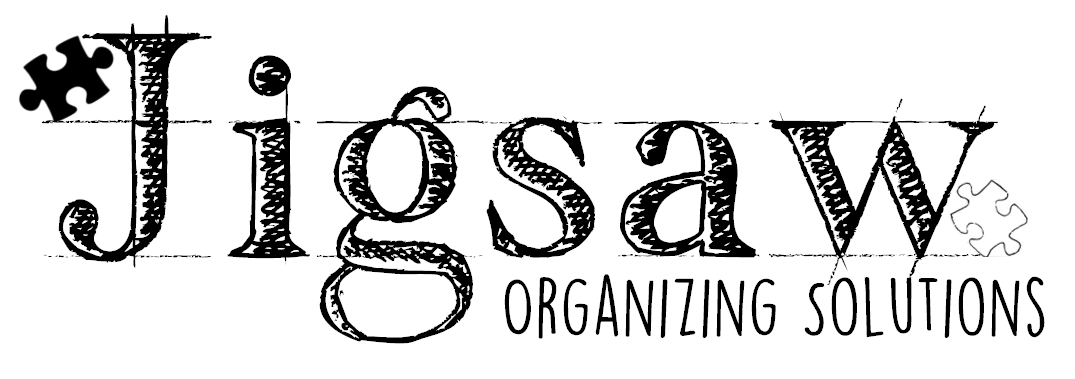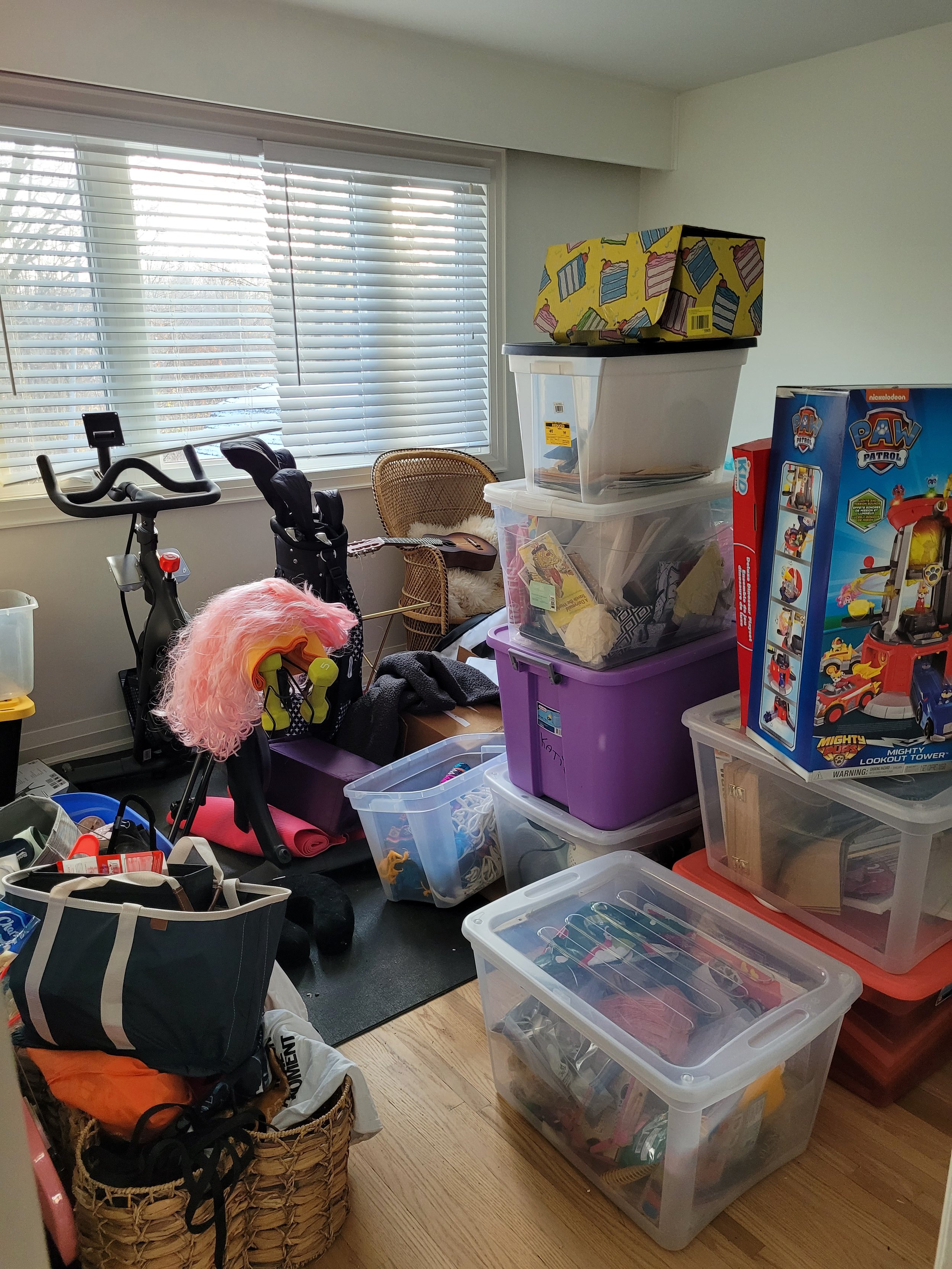Photo by Jigsaw Organizing Solutions
Organizing is such a hot topic. Who doesn’t want to be organized and have their life together?? But there seem to be so many different ways you can get yourself organized, and so many products that will “change your life” when it comes to keeping tidy.
There are also many mistakes you can make, and I come across a lot of these when working with clients! When they’ve tried and failed many times to get organized, that’s when they call me in.
I’ll give you the secrets here today. Avoid these 10 organizing mistakes and you might also be able to avoid hiring an organizer!
1. Purchasing organizing supplies/bins before you start decluttering
Photo by Jigsaw Organizing Solutions, taken at The Container Store in Ohio
There are so many products out there that claim to get you organized. So many different materials, colours, sizes and styles. But the trick is that you should only be buying product AFTER you declutter and sort your items, and only if you actually need them!
After all, you only know how large a container you need when you see the full extent of what you have and actually want to keep!
Opt out of using any new plastic storage containers if you can! It will save you money, allow you to be more creative, and also helps reduce the amount of items that eventually get sent to the landfill. For additional info, check out my other blog “Places you do NOT need a storage bin!”
2. Not giving yourself time or space to organize
No, you don’t need to book an entire week or month off of work to commit to organization, but you do need to set aside dedicated time to it!
Photo by Ralph Hutter on Unsplash
If you are getting overwhelmed by the amount of stuff to go through, even 15 minutes can be really helpful. If you only have 15mins to spare, start by just going through and finding easy things to get rid of: trash, recycling, dirty dishes that can be returned to the kitchen, laundry that can be thrown in your hamper or laundry room. Don’t allow yourself to get distracted by anything else – those 15mins are for organizing only. Put on a timer to keep yourself on track. Start with the easy stuff, and when you have more time to dedicate, go through the boxes of items you haven’t looked at in a long time, or your bursting filing cabinet. Set aside 1hr of time, or 3hrs – whatever you can handle! You don’t want to burn yourself out, so be sure to have water and snacks on hand, and remember to take breaks.
Having the physical space to organize is also important. Whether you can use your dining table as a sorting surface, or the floor of your living room. Generally when you are organizing you make a HUGE mess during the process, and you need that room to spread out and make sorting piles for future decisions.
3. Not having goals/intentions before you start
Why are you choosing now to get organized? Is it a New Year’s Resolution? Is someone moving into your home and you need to make space for them? Maybe you are going to start working from home, and want to have clear designations of work vs home life in your physical space?
Whatever the reason, keep it in the back of your mind for when you are in the throws of it. Maybe even write it on a post-it note and stick it to the wall of the room you’re sorting in! Because you may get to the point of overwhelm and frustration, and you want to have a reason to keep going.
4. Keeping too much stuff
Photo by Jigsaw Organizing Solutions
Regardless of whether you are a minimalist or a maximalist, you don’t want to keep too much stuff. You are limited by your physical space, the ease of access, and your budget. Some people feel it is worth it to pay for a storage unit every month to store items they never look at, but it can become a financial strain.
Be intentional about what you are keeping. It should be items that you use, enjoy using, have special meaning or sentiment, and that are practical for your space. Remember that you don’t need to keep every memorabilia item in its physical form – you can also take photos of the items and keep that instead. Read an earlier blog of mine for some ideas on Repurposing Cherished Items. And you don’t need to keep an entire set of something! A lot of people feel like splitting up a china set is the worst thing you can do, but it’s really not a big deal. Keep a few teacups if that’s all you want!
Keep what is logical for the frequency of use, your available space, and your lifestyle.
5. Keeping donations around too long
When you’ve made a decision to get rid of something, one of the most demotivating things you can do is keep it in a pile or a box in the middle of your room where you see it every day. The project feels unfinished, and those items you “decluttered” are still taking up your precious space!
Same goes if you’re driving around your donations in the back of your vehicle for weeks! Before you start decluttering, look up the nearest donation centre to you and what their hours are so you can coordinate to take them right after you’re done. Schedule it in as part of your “organizing session.
6. Storing items so they are hard access
Photo by Jigsaw Organizing Solutions
The easiest way to get your home looking cluttered again is to make it a challenge to put items away, because when you’re tired or in a hurry, you just won’t put them away properly!
When you’re organizing, avoid having items in front of one another, unless you keep the taller things at the back so you can see what’s at the front. Don’t store items on top of other items unless you can get at them easily. When storing bins on top of eachother, label the outside so you know what’s inside of them. There’s nothing worse than having to pull out a whole bunch of bins because you can’t remember what’s inside the bottom one!
7. Not creating “homes” for things
We all have items in our house that are easily categorical – clothing, food, dishes, books, papers etc. But what about those other things in your house? Batteries, a part for an appliance you never use but want to keep, a container that needs to get returned to someone, jewellery cleaning polish… Those items are just harder to know what to do with!
But still, making a home for them is important! Those are the types of things that will pile up on tables and counters, because where else would they go?
Whatever the item may be, think of how and when you use it, and think about where you can store it so it makes sense to find when you need it.
Appliance parts may go well in a kitchen drawer, or a maybe a little storage box in the cupboard with your appliances. Alternatively, they could go in a little baggie with your warranties/manuals in your filing system. Whatever is logical for YOU! You need to be able to remember where it is when you need it.
Photo by Jigsaw Organizing Solutions
I personally like to have an area where I keep items that are “on their way out” – stuff to return to a store or person, library books I’ve read, etc. I keep these things out somewhere that I normally keep clear so it’s a visual reminder to deal with them – but that only works if you keep the space clear the rest of the time!
8. Storing items on the floor
Not only does this tend to accumulate clutter by having things be dropped and piled on top of them, it also makes it so much harder to clean your space when there are items on the floor, and potentially causes a hazard to yourself and those items!
If you can, store your items on a shelf instead. Use that vertical space so you have more room to work with, and to keep trip hazards at bay!
9. Not organizing items by frequency of use
If you use something frequently, you want to store it in the prime real estate of your cupboards/shelves/drawers etc. I personally like to have items out on counters (in a tidy way of course!), so that they are easy to access. If that’s not your personal style, keep those frequently used items at the front of your drawer, or the most easily reachable cupboard or shelf.
10. Having storage solutions that aren’t flexible
Our lives are always changing, and so should our storage! You never know when you’ll get an extra item that will need to be stored. When organizing your space, make sure you have a little extra room in that storage bin, or some flexibility on the shelf to add if you need to.
This is why I avoid customized storage solutions, because although it may look beautiful in the moment, it will be harder to adapt your organization later on!
What mistakes have you made on your organizing journey?










